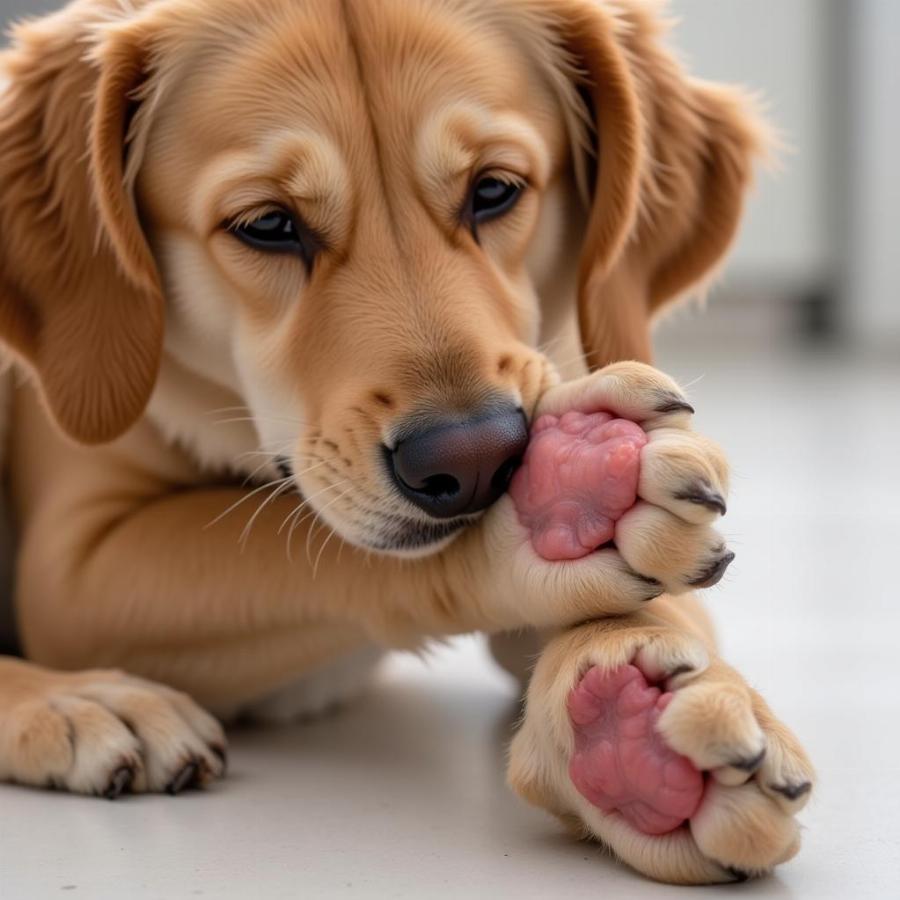Does your dog spend an exorbitant amount of time licking their paws? While a little licking is normal for dogs, excessive licking can be a sign of a deeper issue. As a dedicated dog owner, you’re right to be concerned! Let’s delve into the common reasons behind this behavior and explore ways to soothe your furry friend.
Common Culprits Behind Paw Licking
There are several reasons why your canine companion might be excessively licking their paws. Identifying the root cause is crucial for effective treatment. Here are some possibilities:
1. Allergies: A Common Trigger
Just like humans, dogs can suffer from allergies. Environmental allergens like pollen, dust mites, and mold can irritate their skin, leading to itchy paws. Food allergies are another possibility, with common culprits being beef, dairy, wheat, and soy.
How to Spot Allergies: Aside from excessive licking, look out for other signs like red, inflamed skin, chewing at the paws, and even ear infections.
2. Pesky Parasites
Fleas, ticks, and mites can make your dog’s life miserable! These tiny creatures can burrow into your dog’s fur and cause intense itching, leading to excessive licking and scratching.
How to Spot Parasites: Regularly check your dog’s fur for fleas (tiny, dark brown insects) or ticks (small, oval-shaped bugs that can be black, brown, or reddish-brown).
3. Pain and Discomfort
Licking can sometimes be your dog’s way of soothing pain. A thorn, cut, insect bite, or even a broken nail can cause discomfort, leading to focused licking on the affected paw.
How to Spot Pain: Carefully examine your dog’s paw for any visible injuries. If your dog is limping, whining, or showing other signs of pain, it’s essential to consult a vet.
4. Dry Skin: More Common Than You Think
Dry skin can be a major source of discomfort for your furry friend. Factors like dry weather, frequent bathing with harsh shampoos, and underlying health conditions can all contribute to dry, itchy skin.
How to Spot Dry Skin: Look for flaky, irritated skin, and pay attention if your dog seems to scratch more during the winter months.
 Dog licking paw due to allergies
Dog licking paw due to allergies
5. Anxiety and Boredom
Dogs thrive on routine and stimulation. When they’re feeling anxious, stressed, or bored, they might resort to repetitive behaviors like paw licking as a coping mechanism.
How to Spot Anxiety or Boredom: Pay attention to changes in your dog’s behavior. Increased panting, pacing, destructive behavior, and excessive barking can all be signs of anxiety.
Addressing the Issue: How to Help Your Furry Friend
If your dog’s paw licking is becoming a concern, it’s crucial to take action. Here’s a step-by-step guide to help your furry companion:
-
Consult Your Veterinarian: This is the most crucial step. A vet can help determine the underlying cause of the licking and recommend the most effective treatment plan.
-
Address Allergies: If allergies are the culprit, your vet might recommend allergy testing to pinpoint the triggers. Based on the results, you might need to switch to a hypoallergenic diet, use special shampoos, or administer allergy medication.
-
Parasite Prevention: Keep those pesky parasites at bay! Use veterinarian-recommended flea and tick preventatives year-round, and consult your vet about deworming protocols.
-
Soothe and Moisturize: For dry skin, use a gentle, hypoallergenic shampoo formulated for dogs. You can also apply a vet-approved moisturizing balm to your dog’s paws to provide relief.
-
Enrichment and Exercise: A tired dog is a happy dog! Make sure your dog is getting enough physical activity and mental stimulation. Daily walks, playtime, and interactive toys can work wonders in curbing boredom and anxiety.
When to Worry: Signs of a Serious Problem
While occasional paw licking is normal, excessive or obsessive licking can indicate a serious underlying issue. If you notice any of the following signs, contact your vet immediately:
- Intense Redness, Swelling, or Discharge: These could be signs of infection.
- Open Sores or Lesions: Excessive licking can lead to secondary skin infections.
- Changes in Appetite or Behavior: These could signal pain or discomfort.
- Your Dog Seems Unresponsive to Home Remedies: If the licking persists despite your efforts, seek professional help.
Beaut Dogs: Your Partner in Canine Care
At Beaut Dogs, we understand the special bond you share with your furry friend. We’re committed to providing you with reliable information and expert advice to help you provide the best possible care for your canine companion. If you need further assistance in understanding why your dog licks their paws or require tailored advice, please don’t hesitate to contact us at [email protected]. Let Beaut Dogs be your trusted source for all things dog!